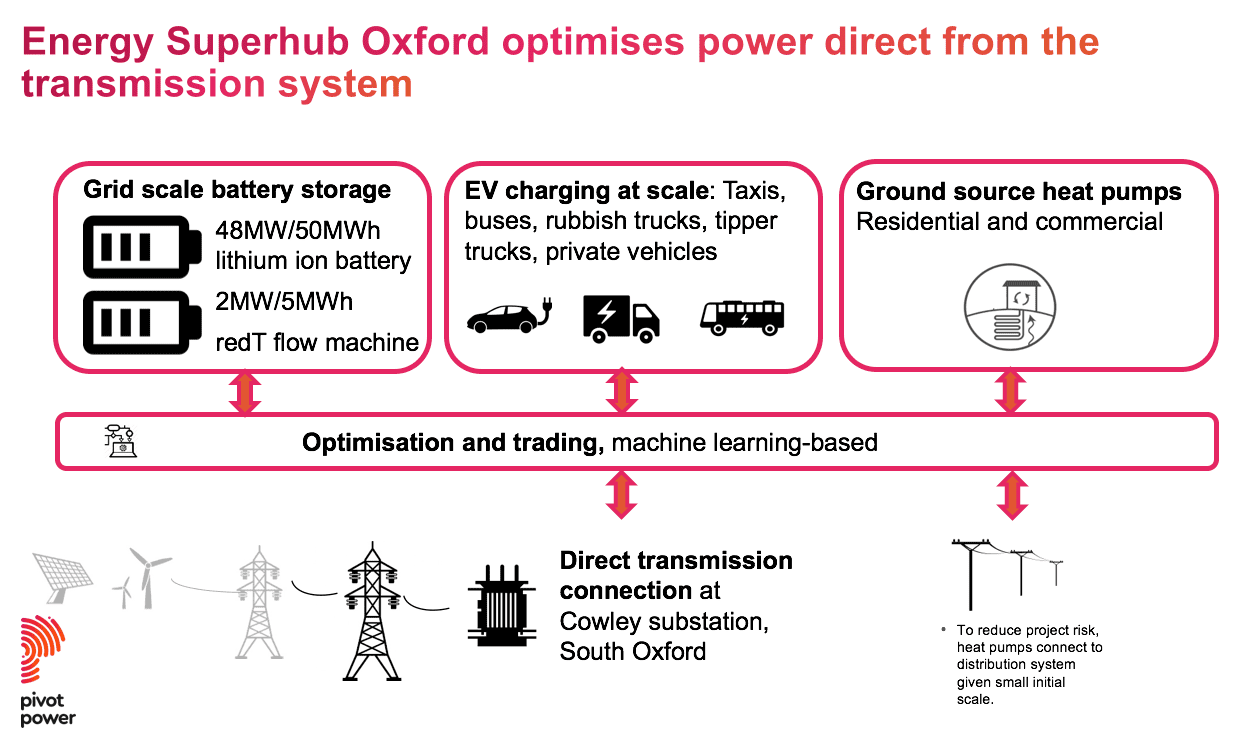Ground source review: Rees Farm
Owen built the high tech, eco house of his dreams in rural Gloucester, complete with Kensa’s market-leading ground source heat pump technology seamlessly linked to innovative smart controls.
Summary:
Read the full article at KENSACONTRACTING.COM
The scope for mass deployment of ground source heat pumps has been visualised in a new animation unveiled by Kensa Contracting.
Titled, ‘Community Heating – How To: District Heating with Ground Source Heat Pumps‘, the new film illustrates the multiple energy sources that can be used with Kensa ground source heat pumps to rival and replacing the gas network to help the UK meet its net-zero carbon emissions target by 2050.
Kensa Contracting’s Managing Director, Dr. Matthew Trewhella, says:
Our latest film demonstrates the technologies very real and diverse potential which Kensa is already implementing, including utilising heat from flooded mine workings, to ‘micro-district’ shared ground loop arrays for smaller isolated or phased communities, to using energy boosters to harvest waste heat to further enhance the efficiency of ground source heat pumps and provide cooling.
Heating communities – new and old – with district ground source heat pumps has never been easier. Discover the multiple energy sources Kensa Contracting utilises to supply sustainable, low carbon heat to communities via ambient temperature loops and individual Kensa ground source heat pumps inside each dwelling.
Five derelict stone barns on a picturesque Cotswold Farm were converted into luxury holiday lets, Bibury Barns, featuring eco-friendly and efficient ground source heat pump technology from Kensa.
This conversion won Greengauge Building Energy Consultants ‘Retrofit Project of the Year’ at the H&V News Awards 2019.
Summary:
Read the full article at KENSACONTRACTING.COM
The H&V News Awards judging panel described the Enfield tower block retrofit as, “a clear winner with demonstrable innovation, excellence in installation plus wide benefits to the client and residents.”
Dr Matthew Trewhella, Managing Director of Kensa Contracting, says:
The H&V News Award affirms this project’s place as one of the most significant and ground-breaking milestones for district heating, ground source technology and the renewable energy industry as a whole. Kensa’s district heating system architecture produces the multiple benefits of reduced fuel bills, energy security, electrification of heat, decarbonisation and reduction of particulate emissions. The Enfield project demonstrates that the system can be deployed rapidly and at large scale and represents a blueprint for the future of heating in tower blocks across London and the rest of the country.
Summary: Kensa explains how plans for widespread deployment of heat pumps will help to reduce strain on the electricity grid.
Read the full article at KENSACONTRACTING.COM
Dr. Matthew Trewhella, Managing Director of Kensa Contracting, comments:
The rapid decarbonisation of the electricity grid over the last five years has added more momentum towards the electrification of heat. Concerns have been expressed that shifting load from fossil fuels such as oil, LPG and ultimately mains gas, will unduly increase the strain on the electricity grid beyond its capacity – particularly at peak times.
By using smart controls that learn the occupant’s preferences and building heat physics, it is possible to avoid the peaks of grid strain and shift load to the times when the grid can best accommodate it. If you combine some energy storage local to the heat pump, it is possible to even further reduce the peak demand. This means that ground source heat pumps transform from being a potential strain on the grid to becoming part of the solution.
The ground-breaking Energy Superhub in Oxford as a prime example of how ground source heat pumps can be used with grid-scale energy storage and load-shifting initiatives.
 With recent announcements from the Committee for Climate Change and the Government calling for significantly higher numbers of heat pump installations, the Kensa Group has announced changes to its senior management team and additional business services as it looks to celebrate its 20th anniversary with continued rapid growth. Read more
With recent announcements from the Committee for Climate Change and the Government calling for significantly higher numbers of heat pump installations, the Kensa Group has announced changes to its senior management team and additional business services as it looks to celebrate its 20th anniversary with continued rapid growth. Read more
Your choice of heating system could be of great consequence for your building project for years to come. Ground source heat pumps have low running costs, minimal maintenance and a long lifetime and qualify for a generous income from the Domestic Renewable Heat Incentive (RHI: this scheme has now closed – please visit this page to explore other funding). In this blog, find out if your project could benefit from ground source. Read more
Summary
Read the full article at KENSACONTRACTING.COM

Councillor Tom Hayes, Executive Board Member for a Safer and Greener Environment said:
The City Council is working towards a Zero Carbon Oxford to tackle dangerous climate change in the time available to us to save the planet. Uniquely, this £41m once-in-a-generation downpayment on Oxford will move the Council closer to achieving this vision. This project enables the council to move our own vehicles to electric on a faster timescale and, crucially, to install heat energy across homes to tackle fuel poverty.
Dr. Matthew Trewhella, Managing Director of Kensa Contracting said:
Ground source heat pumps are a tried and tested technology that have been shown to produce significant carbon savings, low running costs and zero point of use air pollution. The rapid decarbonisation of the electricity grid over the last 5 years has added more momentum in the push towards the electrification of heat. There have been concerns expressed that shifting load from fossil fuels such as oil, LPG and ultimately mains gas will unduly increase the strain on the electricity grid beyond its capacity – particularly at peak times.
By using smart controls that learn the occupant’s preferences and building heat physics, it will be possible to avoid the peaks of grid strain and shift load to the times when the grid can best accommodate it. Better still, these times also have lower carbon and lower cost electricity which further increases the appeal of ground source heat pumps. This combination means that ground source heat pumps transform from being a potential strain on the grid to becoming part of the solution. When added to the battery storage and electric vehicle charging elements of this project, it creates a powerful energy system that is fit and ready for a low carbon future.
Summary:
Read the full article at KENSACONTRACTING.COM
A diverse array of properties will take part in the heating upgrade scheme, from bedsits to maisonettes, low rise flats, houses and bungalows. It is estimated the investment will reduce lifetime carbon emissions by up to 40 tonnes in the bedsits to 200 tonnes in the three-bed flats; the project will result in massive emissions savings, comparable to a 5MW solar PV farm featuring 20,000 solar panels covering an area of 30 acres.
Tenant fuel bills will be reduced by typically 30-50%, annually saving around £150 per bedsit up to £500 per house.
Patrick Berry, Managing Director of Together Housing’s Energy Services, comments:
This investment is a major commitment to ensuring our homes are affordable and energy efficient. Using renewable heat we can provide our customers with clean, comfortable, low cost energy and lower our carbon impact. It forms a part of Together Housing’s strategy to maximise the potential of renewable heat and power and we are delighted that the projects are now underway.
Dr Matthew Trewhella, Managing Director of Kensa Contracting, comments:
Together Housing’s landmark investment in ground source heat pumps via the Procure Plus framework is a pioneering step by a social housing provider to address the emissions of existing housing stock and fuel poverty levels; their commitment to innovation, community, and the environment is a benchmark for fellow housing associations and new build developers to follow.
As we come through the coldest months of the year, EG3 and National Energy Action (NEA) have published worrying statistics showing an alarming annual rise in the number of excess winter deaths, stating that UK winter mortality rates in 2018 hit their highest since 1976.
It is clear that something has to be done, and urgently. UK manufacturer Kensa Heat Pumps looks at the role ground source heat pumps can play in alleviating the problem of fuel poverty in rural off gas grid areas, and addresses some of the misconceptions about the widespread deployment of the technology versus oil alternatives. Read more
The Kensa Group, the UK’s leading manufacturer and installer of ground source heat pumps, has welcomed the Committee for Climate Change’s (CCC) recommendation that gas boiler installations should be outlawed in new homes by 2025.
In response to the Committee’s call for a more sustainable infrastructure to heat our homes, Simon Lomax, CEO of the Kensa Group says:
We wholly embrace the CCC’s call for urgent action and would hope the Government would look to introduce this requirement before 2025. The report identified a skills gap, but the knowledge and technology is already here and is deploying at scale in more challenging retrofit applications.
Kensa recently installed England’s largest residential ground source heat pump installation at eight high-rise tower blocks owned by the London Borough of Enfield. This project featured the ‘shared ground loop array’ infrastructure which effectively takes the place of the gas network and serves an individual heat pump and hot water cylinder installed inside each dwelling.
Lomax says:
Government has delayed the introduction of any effective regulations that will encourage the deployment of heat pumps in new build housing. Thankfully, the Greater London Authority (GLA) has lost its patience and now requires planning applicants to base their energy strategies on the forthcoming carbon intensity factors proposed for the next generation of SAP, the software that demonstrates compliance with building regulations. As a result, London will lead the way.
The expected increase in heat pump deployment prompted the GLA to commission a 2018 report, ‘Low Carbon Heat: Heat Pumps In London’. Kensa’s shared ground loop infrastructure is described in the report as ‘the most efficient, lowest carbon, and lowest cost solution when utilised in new build houses compared to various air source, direct electric, gas and CHP configurations’.
Lomax continues:
For fast-track projects, shared ground loop installations qualify for subsidy support via the Non Domestic Renewable Heat Incentive (RHI: this scheme has now closed – please visit this page to explore other funding), which runs until Spring 2021. Beyond that, it is likely that entities will emerge to fund, own and maintain the ground arrays in return for an annual connection fee so any developer can sidestep the cost burden. This will ensure that more efficient, reliable and durable ground source heat pumps will cost no more than air source heat pumps. In time, more innovative models will emerge which sell energy as a service for a fixed fee to any householder; a ground source heat pump is perfectly suited to this innovation.
Whilst the headlines focus on the deployment of heat pumps in new builds, the Committee for Climate Change report also claims insulation levels must be significantly increased in current homes if heat pumps are to be deployed at scale to our existing housing stock, blaming the stalled uptake of insulation as a major contributing factor to the increase in household emissions last year. However Kensa questions the Committee’s suggestion that insulation is a pre-requisite before a heat pump installation. According to Dr Matthew Trewhella, Managing Director of Kensa Contracting:
The vast majority of Kensa Contracting’s large-scale retrofit works are in social properties with an EPC rating of D or lower. Delta-E, in its December 2018 study into the ‘Technical Feasibility of Electric Heating in Rural Off-Gas Grid Dwellings’, reported that, ‘based on average peak winter day temperatures, around 84% of homes can be electrified at their current level of insulation. This increases to around 93% if all suitable homes have loft & wall insulation installed’. Whilst we strongly encourage the roll out of insulation to reduce household emissions, this should not be seen as a requirement before the retrofit of a ground source heat pump.
With the help of ground source heat pumps, you can convert the electricity generated by on-site renewable technologies – such as hydro, wind and solar photovoltaics (PV) – into valuable sustainable heat that can be directed towards lucrative new commercial enterprises. And you’ll get paid by the government to do it! Read more

Ground source heat pump manufacturer, Kensa Heat Pumps, has added fuel to the debate about how the UK can tackle the growing problem of fuel poverty. The response comes in light of reports that in 2018 excess winter deaths hit their highest recorded levels since 1976.
Kensa Group CEO, Simon Lomax says:
It is clear that something has to be done, and urgently. There has been much industry discussion recently about the growing problem of fuel poverty and the heating technologies that could help alleviate this issue. The oil heating body OFTEC has suggested that oil boilers are a more suitable solution than ground source heat pumps for rural householders in fuel poverty, and that they are ‘the cheapest fuel available to off-grid homes’ – a suggestion that Kensa disagrees with. Far from being the cheapest option, heat from an oil boiler costs 21% more.
Kensa’s claims follow a rolling programme of off gas grid heating upgrades featuring Kensa heat pumps in social housing properties, where prior to the upgrades some tenants were fuel poor. Simon continues:
Misleading claims that ground source heat pump’s are a technology for the ‘wealthy few’ are wholly incorrect given none of these aforementioned residents will pay a penny for their Kensa system, and many were in fuel poverty before the installations dramatically reduced their heating bills.
Further, claims that rural properties are not suited to ground source heat pumps due to their lack of insulation are also dangerously misleading – all homes should be well insulated for all heating types: for heat pumps it is not essential, but equally desirable.
A recent report examining the ‘Technical Feasibility of Electric Heating in Rural Off-Gas Grid Dwellings’, supports Kensa’s viewpoint, reporting that ‘based on average peak winter day temperatures, around 84% of homes can be electrified at their current level of insulation. This increases to around 93% if all suitable homes have loft & wall insulation installed’.
Kensa also identifies the bigger picture associated with the specification of oil – and gas – boilers:
Using the carbon intensity factors proposed for SAP 10, an oil boiler emits almost five times as much carbon as a ground source heat pump; there is absolutely no moral justification for their continued use when far more appealing options are available. And we haven’t even talked about air quality. Should synthetic oils ever emerge to reduce the carbon emissions the debate has validity, but the harsh reality for the oil sector is that other technologies are making bigger strides forward and will offer more compelling choices for those in fuel poverty and beyond. Climate change was caused by oil: oil will not be the saviour.
Further to replacing oil in rural areas the case for ground source heat pumps has been made for replacing gas in cities; the Committee for Climate Change recently called for an end to gas grid connections to new homes by 2025 in favour of heat pump infrastructure. The report follows the Greater London Authority (GLA) identifying the primary role of heat pumps to deliver low carbon heat in the capital. The GLA report, ‘Low Carbon Heat: Heat Pumps in London’ concludes:
Compared to various air source, direct electric, gas and CHP configurations in new build houses, shared ground loop arrays are the most efficient, lowest carbon, and lowest cost solution.
Kensa explores the oil industries claims further in a blog comparing oil versus ground source heat pumps here.
David Pearson of Star Renewable Energy replied to Kensa’s article orginally published by H&V News:
Hard to add more than Simon already has other than to say that the real challenge is not to offer a better outcome than oil in the countryside but better than gas in the cities.
This will define our success or failure to provide an outcome our children will be proud of……….and it absolutely will include consideration of air pollution. gas is a dirty fuel by comparison to a heat pump – of course oil being even worse!
Graham Hazell of the Heat Pump Association replied:
“Sorry kids and Grandkids. we were so inconsiderate and tight we decided to burn oil and ruin the climate beyond repair” or that seems to be what OFTEC would say.
Agree with Simon Lomax: the oil industry has some very big questions to answer re climate change.
As Rose says ECO 3 is there to help those less able to pay and it would be easy to support this further for the sake of low carbon solutions for future generations rather than continue to install 100,000’s of oil boilers in the hope that a suitably low carbon low cost bio oil will be viable.
A similar argument (economics) was used by UK manufacturers of land mines- hey ho.